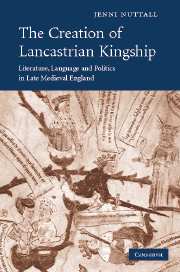Book contents
- Frontmatter
- Contents
- Acknowledgements
- Note on quotations and references
- Note on editions
- Abbreviations
- Introduction
- PART I HOUSEHOLD NARRATIVES
- PART II CREDIT AND LOVE
- 6 Promises, expectations, explanations and solutions
- 7 A discourse of credit and loyalty
- 8 Credit and fraud in Hoccleve's Regiment
- Conclusion: Lancastrian conversations
- Notes
- Bibliography
- Index
- CAMBRIDGE STUDIES IN MEDIEVAL LITERATURE
7 - A discourse of credit and loyalty
Published online by Cambridge University Press: 27 October 2009
- Frontmatter
- Contents
- Acknowledgements
- Note on quotations and references
- Note on editions
- Abbreviations
- Introduction
- PART I HOUSEHOLD NARRATIVES
- PART II CREDIT AND LOVE
- 6 Promises, expectations, explanations and solutions
- 7 A discourse of credit and loyalty
- 8 Credit and fraud in Hoccleve's Regiment
- Conclusion: Lancastrian conversations
- Notes
- Bibliography
- Index
- CAMBRIDGE STUDIES IN MEDIEVAL LITERATURE
Summary
Like Hoccleve and the addressee of the Regiment, Prince Henry, the Crown and its subjects were united by reciprocal relationships of subsidy, service and reward. Yet this reciprocal relationship included not just the mechanisms of grant and payment outlined in Chapter 6, but also incorporated other less straightforwardly economic exchanges. The financial dealings between a sovereign and his subjects were inextricably linked to discussions of other matters, particularly the reciprocal exchange of loyalty, love and respect between king and people, and the amount of authority and respect which a monarch could command. Henry IV's unsteady claim to the fealty of the English people, in combination with the breakdown in financial relations between the Crown and many of its subjects in the first decade of Lancastrian rule, threw this reciprocal bond into stark relief. Lancastrian authors correspondingly prioritized exchanges of advice, money and love between a monarch and his people in their poetry. They revived pre-existing discourses which linked credit, counsel and loyalty together. The relationship between the Crown and its subjects, in financial and in more abstract terms, and the language in which this relationship was negotiated, receives heavy emphasis in many forms of Lancastrian writing. This chapter explores four particular locations where what one might call a discourse of credit (punningly incorporating belief in and loyalty towards a monarch's sovereignty as well as purely financial resources) was used or revitalized in Lancastrian texts.
- Type
- Chapter
- Information
- The Creation of Lancastrian KingshipLiterature, Language and Politics in Late Medieval England, pp. 94 - 108Publisher: Cambridge University PressPrint publication year: 2007



